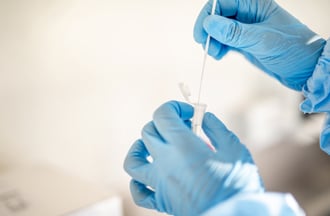
Translations:
Llamamiento a los Gobiernos para que Sigan las Directrices Mundiales sobre Pruebas COVID-19 a Tripulaciones (pdf)
Les États exhortés à suivre les lignes directrices sur le dépistage chez les équipages (pdf)
Montreal - The International Air Transport Association (IATA) and the International Federation of Air Line Pilots’ Associations (IFALPA) jointly called on governments to follow the International Civil Aviation Organization (ICAO) Council Aviation Recovery Task Force (CART) guidelines to exempt crews from COVID-19 testing that is applied to air travelers.
The CART guidelines specifically recommend that crew members should not be subject to screening or restrictions applicable to other travelers. Furthermore, according to CART. health screening methods for crew members should be as “non-invasive as possible.”
Despite this guidance, an increasing number of States are applying the same public health measures for crew that are applied to the general traveling public. Such measures include providing proof of a negative COVID test prior to departure and in some cases a second negative COVID test is required upon arrival. Furthermore, several civil aviation regulators only allow crew members with a negative COVID-19 PCR test certificate to layover in their respective countries.
“These measures not only contravene the recommended ICAO global guidance, they fail to take into account the fact that interactions with the local population are minimized,” said Gilberto Lopez Meyer, IATA’s Senior Vice President, Safety and Flight Operations. For example, crew on layover are often restricted to the hotel. Such measures also ignore the fact that airlines already comply with the requirements of their home country health protection and monitoring programs to manage crew health, which typically includes measures to reduce the risk of infection.
“The measures being employed by some States are not only contravening the recommended guidance but are also putting undue stress and pressure on crews. The guidance provided has been carefully developed to ensure operations can continue without jeopardizing safety for both crews and passengers,” said Captain Jack Netskar, IFALPA President.
In addition to the intrusion and physical discomfort of daily COVID-19 testing, there are significant cost considerations. One global airline has estimated the cost of complying with such requirements for a single daily flight would add up to an additional US $950,000 per year.
“Airlines are willing to invest in safety that delivers meaningful outcomes, but that is not the case with unilateral, uncoordinated testing requirements. States should acknowledge that crew present a different risk profile than passengers and that more flexibility and relaxation of testing requirements and/or quarantine could be considered including exemptions,” said Lopez Meyer.
For more information:
Corporate Communications
Tel: +41 22 770 2967
Email: corpcomms@iata.org
IFALPA Communications
Tel: +1 514 419 1191
Email: communications@ifalpa.org
Notes for Editors:
- IATA (International Air Transport Association) represents some 290 airlines comprising 82% of global air traffic.
- You can follow us at https://twitter.com/iata for announcements, policy positions, and other useful industry information.
- The International Federation of Air Line Pilots’ Associations represents more than 100,000 pilots in nearly 100 countries around the globe. The mission of IFALPA is to promote the highest level of aviation safety worldwide and to be the global advocate of the piloting profession; providing representation, services and support to both our members and the aviation industry. Please visit ifalpa.org for more information.

